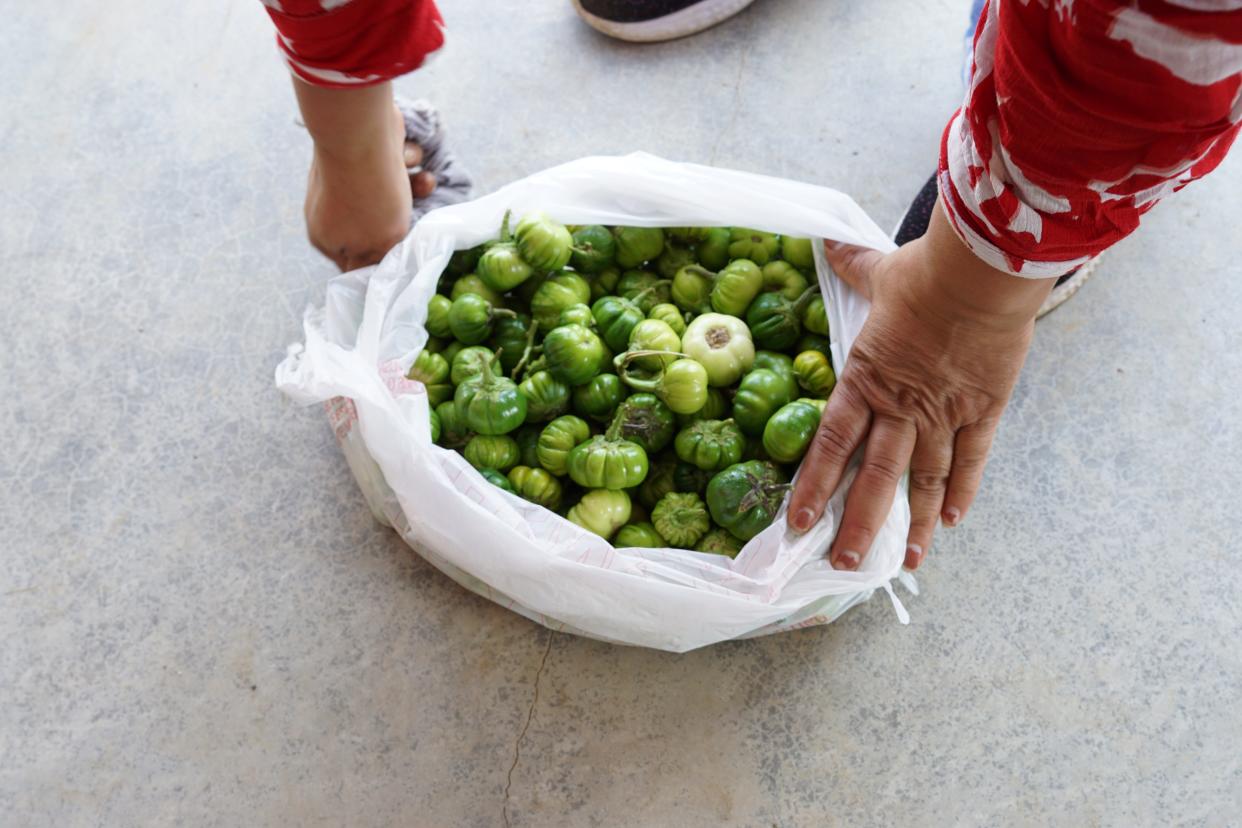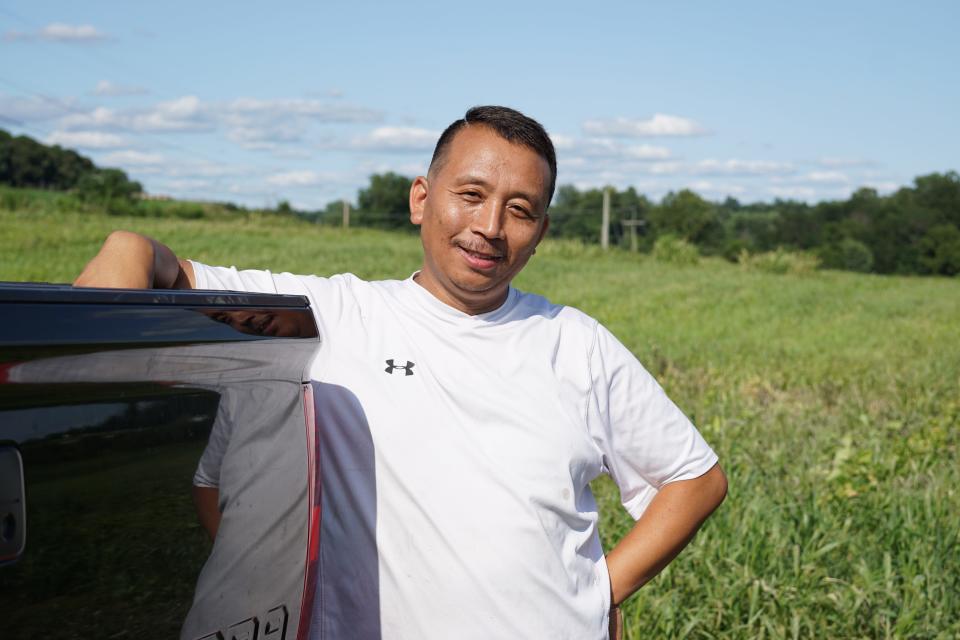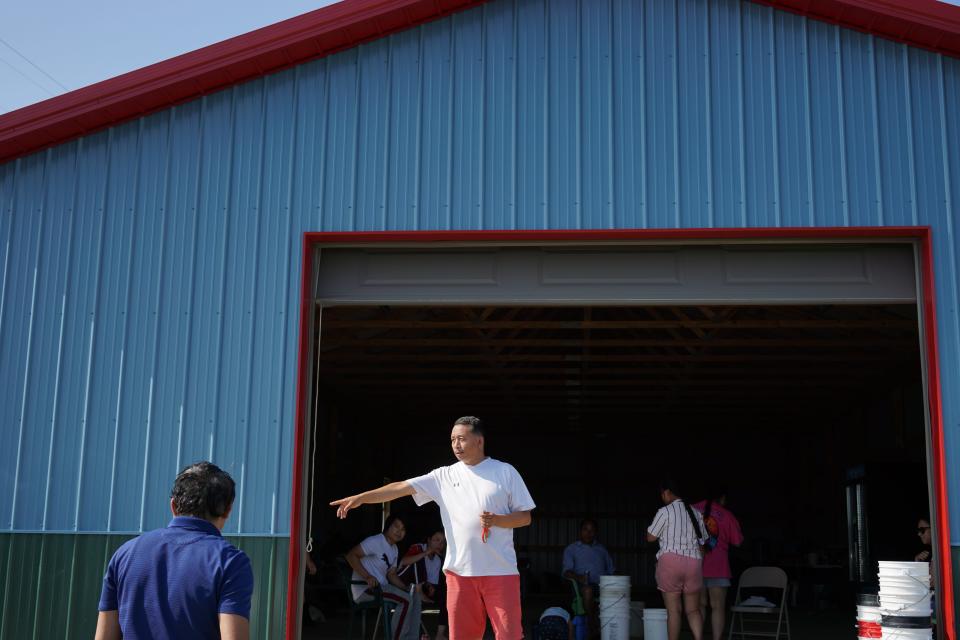New Americans harvest vegetables and memories of Bhutan at unique, pick-your-own farm

Bir Magar heaved a large bucket of tomatoes from the hot sun into the shade of the barn, sat down and cracked a wide smile.
“It makes me happy to feel the soil on my hands,” the 42-year-old said in Nepali, examining the dirt under his fingernails.
Magar, who works at a food processing plant and lives in Blacklick, had come to spend his Saturday afternoon at Rai Farm, a pick-your-own vegetable business in Glenford in Perry County that caters to the Bhutanese-Nepali community of Greater Columbus.
The farm’s muddy parking lot was beginning to fill up with cars. Families, carrying buckets and sun umbrellas, wandered out into fields planted with Bhutanese and Nepali varieties of hot peppers, corn and sprawling cucumber.
Rai Farm began four years ago when Rup Rai, 39, and his wife, Raaya, 36, bought 21 acres on a gently rolling hill just off Interstate 70, about an hour outside Downtown Columbus. The couple commute from Pataskala, where they both work full-time at an Amazon warehouse when they are not farming.
Rup Rai told The Dispatch that he enjoys providing food to his community at a reasonable price and giving people the chance to rediscover agriculture by picking their own vegetables.
“For the older generation, it’s a place where they can come and remember what farming was like back in Bhutan,” he said in Nepali.

'Leveling the playing field': Summer camp readies immigrants' kids for college, job market
Before fleeing from Bhutan to Nepal as refugees in the early 1990s, many Bhutanese-Nepalis farmed rice, corn and cash crops like betel nut in Bhutan’s southern lowlands. Around 30,000 have settled in Greater Columbus since 2007, finding work in health care, industry and other fields — though few have taken up agriculture.
Neither of the Rais had farming experience when they bought their land in 2018, having spent most of their childhood and adolescence in refugee camps in Nepal before resettling in the U.S. in 2008. Rup Rai said he trained himself using YouTube videos and advice from older community members.
His crops include many Bhutanese or Nepali varieties of vegetables that are difficult to find elsewhere.
Customers Mitra Bhattarai, 48, who was born in Bhutan, and his wife, Deepa Koirala, 43, who was born in Nepal, said they came to Rai Farm to pick “tite bi” or bitter tomato (Solanum aethiopicum) and Bhutanese chili peppers for making ema datshi, a fondue-like dish.

“Being outdoors here reminds me of my family’s orange grove back in Bhutan,” Mangali Rai, 46, of Pickerington (no relation to the farm owners), said in Nepali. She said she came to the U.S. in 2017 and was harvesting tomatoes to make achaar, or spicy pickle.
Related: Reynoldsburg artist's music reflects experience of Bhutanese-Nepali refugees
On Saturday, one bucket of tomatoes was selling for $13, or less than $1 per pound — far less than Walmart or Kroger, one customer noted. (The farm is open to the public, but there are special prices for members of the Bhutanese-Nepali community.)
Rup Rai said he does not use any chemical fertilizers or pesticides, although the farm is not yet certified as organic. With limited manpower and no tractor, he battles to keep invasive species from choking out his crops.
“Weeds are my enemy,” he said.
Luckily, though, some of the “weeds” that spring up — such as lamb's quarters (Chenopodium album) and purslane (Portulaca oleracea) — are edible. In Nepali cuisine, they often are fried up with garlic, turmeric and dried chilies. Rup Rai encourages customers to uproot these greens and take them home at no extra cost.

Picking vegetables may evoke a sense of nostalgia for some older Bhutanese-Nepalis, but the farm does not seem to generate the same excitement among the youth.
As their parents were out in the fields picking vegetables, a group of young women congregated by the barn, snacking on ice cream sandwiches.
“Farming is not my favorite,” said Monalisha Rai, 18, of Akron, whose great-aunt is Mangali Rai. “But our parents like it. They’re, like, typical Nepali.”
More: Bhutanese-Nepali community celebrates literature as a way to preserve culture
For the time being, the farm is a part-time venture for Rup Rai, who still works 40 hours per week at an Amazon warehouse. However, he hopes to transition to farming full-time someday and spend more time outdoors.
“People get stressed out because of work (in the city), but it’s not like that here,” he said. “If I want to take a walk I can do that, and I can meet people from the community and chat with them. There’s freedom out here.”
Peter Gill covers immigration and new American communities for the Dispatch in partnership with Report for America. You can support work like his with a tax-deductible donation to Report for America here: bit.ly/3fNsGaZ.
Contact Peter at pgill@dispatch.com or follow him on Twittter: @pitaarji
This article originally appeared on The Columbus Dispatch: Bhutanese-Nepali pick-your-own farm offers more than vegetables

